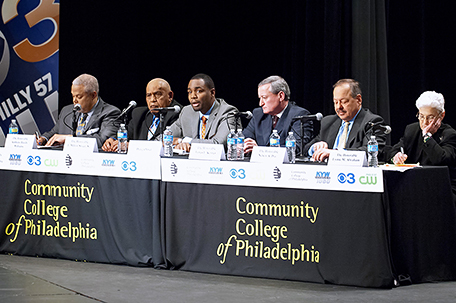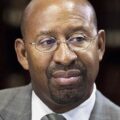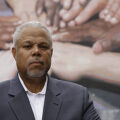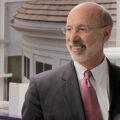
ABOVE PHOTO: Doug Oliver makes his point to a rapt audience, during last week’s PABJ/Community College of Phila. Mayoral Debate. (Photo by Bill Z. Foster)
Because he feels he’s got the best ideas for Philadelphia, Doug Oliver has decided to go big, or go home in his first run for political office.
The Run For The Big Chair
Editor’s note: This is the fourth in a series of interviews of the people running for Mayor of Philadelphia between now and the May 19th Pennsylvania Primary.
By Denise Clay
When most people enter elective politics, they go for something small.
They may run for committeeperson or ward leader. Some may run for city council person, state representative, or state senate. If one is really ambitious, a run for Congress might be in the offing.
But Doug Oliver isn’t most people. The former vice president for communications for the Philadelphia Gas Works and press secretary for Mayor Michael Nutter decided that when it comes to his first outing in politics, he was gonna go big or go home.
He was going for the Big Chair.
And despite the fact that there are a lot of people who believe he’s bitten off more than he can chew, Oliver thinks that his time is now.
“The idea that you have to run for something else first just makes no sense to me,” he said. “I chose to defy convention because you should be able to run for whatever office you want to whenever you want to. There’s no assembly line for leadership.”
In an interview with the SUN, Oliver talks about his plans for the city, how he’s managing to get his message across, and how much he’s learned about Philadelphia’s voters through the simple act of taking the Broad Street Line.
SUN: Thank you for your time today Mr. Oliver. I guess I’ll start my interview with you the same question that I’ve started every interview in The Run For The Big Chair series with. What made you decide to run for Mayor?
DO: I decided to run for Mayor because I love my city. I’m a lifelong Philadelphia resident; grew up in Germantown. I’ve spent my academic and professional career not far from where I grew up. I believe that my life and my professional experiences have prepared me for this opportunity. This city needs a change of perspective and a fresh set of eyes.
When I turned 40, I decided that after consulting with my family, friends, mentors and God that I would jump into this race with both feet. I’ve never run for office before, but I’ve been around politics, I’ve done community service, and I’ve been a businessman. As I said, my life has prepared me for this.
SUN: What do you see as the biggest issues facing the city right now?
DO: We have a city divided between those who have and those who don’t. The prosperity that’s reflected in some sections of the city isn’t reflected everywhere. Education and jobs are the bridge that will connect one group to the other. Almost all of the city’s challenges can be traced to the lack of education and employment.
My primary goal is to focus on these things. Everyone who is running against me that has held an elected office has had decades to focus on these things, but if they’ve had an idea to solve these problems, I’d like to know what it is. I know that no one does it alone and I don’t want to dismiss the work of those currently in office, but people leave the city because they can’t find a job, and because they’re afraid that their kids won’t get a good education.
SUN: Since this is your first campaign, a lot of things are probably new to you. What are you hearing from people as you go out on the campaign trail?
DO: It’s like drinking water from a fire hydrant. There are no shortage of challenges in this city and no shortage of opinions about how to deal with those challenges. There are 1.6 million people in the city and I’ll never meet all of them. But I get on SEPTA and I meet a lot of people.
While a lot of people make a big deal about my age, in this case it’s good to be young. I don’t get tired of being out there. You should be hands on and I have a lot of energy. But I’m also doing a lot of listening. I can’t interrupt them as they say to me “You politicians don’t come around here for four years! You just come here when you want to get elected!” I hope that they see that my heart beats for this city and that I recognize that not all of the decisions that our leaders have made have benefitted everyone in the city. We need to make better decisions.
SUN: When you say we need to make better decisions, what do you mean?
DO: Well, let’s look at the 10-year-tax abatement. The whole idea behind that was to help neighborhoods grow. We’ve given up $80 million in taxes, but has it been worth the investment? We need to think about where and how the tax abatement is used.
SUN: This is your first political race and it’s for a pretty big job. Why did you decide to go for this particular office instead of running for something smaller first?
DO: I think that the Executive Branch best suits me.
SUN: But I’m sure that there are people who believe that you’ve bitten off more than you can chew.
DO: I’ve heard that indirectly, but no one has said it outright. I’ve also had people try and tell me about the consequences of trying and failing in this run. There’s been some “If you lose…” The possibility of failing has never scared me. I’m was more afraid not to run than I would be of running and losing. The idea of running, winning and not accomplishing anything is what keeps me up at night.
SUN: Another important issue that you’ll have to deal with if you become Mayor will be the issue of education. The folks at Pew have published a study that says that this is the issue that voters are most focused on. What is your plan to deal with this issue should you become the Next Mayor?
DO: So far, the conversation about education has been about governance, funding, charter schools versus school district schools and to some extent curriculum. Curriculum isn’t discussed as much as it should be. If money is being dumped into a curriculum that doesn’t advance kids, we shouldn’t continue to do that.
We also need to spend less time on the charter vs. district debate because it divides us. The real debate needs to be between high performing vs. underperforming schools. If we keep throwing money at underperforming schools and things don’t improve, we may as well burn the money. While I wouldn’t necessarily close these schools, I’d see that the necessary changes were made to make them high-performing schools, especially if it was in a neighborhood that doesn’t have one.
SUN: What about the School Reform Commission?
DO: I’d change the role of the SRC to one of regulation rather than operation. For example, the Public Utilities Commission regulates the Philadelphia Gas Works. It makes sure that natural gas is distributed safely. In that same vein, the SRC should be used to make sure that all of the kids are educated and should leave it to the educators themselves to figure out why they’re failing.
SUN: Funding of education is one of the issues that have come up most in this election. What ideas do you have about that?
DO: Our children should get what they deserve and I’ll fight for them. We should work with what we have and I’ll work with [Gov. Tom Wolf] and City Council. When it comes to funding schools, there are things that we can do locally to generate revenue that don’t involve raising taxes or selling city assets. Those should be last-ditch efforts.
For example, we have a lot of responsible colleges and universities we have here in Philadelphia. They do a lot, but we need them to do a little bit more. They have resources that are available to us. They can play a role in helping with our educational challenges through either payments in lieu of taxes, or services in lieu of taxes. The city has $500 million in uncollected taxes and we should be more aggressive in going after that money. Also, we should consider keeping the city open past 2 a.m. so that we can make more money off of the city’s liquor-by-the-drink tax.
Before we state shaking down Grandma for more money in taxes, we need to look at other ways to find the money.
SUN: The job that most people associate you with, other than your work at the Philadelphia Gas Works, is as Press Secretary for Mayor Michael Nutter in his first term. You also worked under Gov. Ed Rendell as Director of Communications for the Department of Public Welfare. What have you learned from these men that you’ve been able to use on your own campaign?
DO: I try to be a sponge around leaders. I take a look at what they’ve done that’s worked and try to use it, and leave what doesn’t work.
While working with Mayor Nutter, I saw him guide the city through a tough economic crisis. He’s left the city in a position where the next mayor will be able to take advantage of the ways that the economy has improved under his watch and has allowed the city to attract young talent. That’s the job of the mayor; to put the next mayor in a position to help the city grow.
I’ve also learned that you have to have a good relationship with City Council because in the end, it’s not necessarily what you want, but what you can negotiate.
SUN: Another subject that has come up quite a bit in this campaign is the relationship between the police and the community. A report was recently issued from the Department of Justice’s COPS Office that featured 91 recommendations related to officer-involved shootings.
Now you got in a bit of trouble recently when you were quoted as saying, and I’m paraphrasing, that while the Black community may have a reasonable fear of police, it’s also reasonable for police to fear Black men.
DO: I’m willing to concede that the words that I used might not have helped me make my point clearly. But if you want to fix a problem, you must first acknowledge that it exists. If I don’t acknowledge that the behavior of some of the police, not all, and the behavior of some in the Black community, not all, is responsible for the mistrust on both sides, I’m being less than honest.
But in the short term, I think that one of the ways we can make things better is through sensitivity and cultural training. In the long term, we need to focus on creating jobs and helping everyone get a better education. Almost everyone involved in violent crime is either under educated, unemployed or both.
SUN: Here’s my last question. You’re the youngest person running for Mayor this time around. A lot of people have described you as “the candidate for Millennials”. What do you think when you hear that? Do you think that puts you in a box you don’t want to be in?
DO: I find that the young people that I talk to are more engaged, but I can’t say that I represent all of them because I haven’t talked to all of them.
At 40, I’m in a pretty unique place. I’m old to some, but I’m young to others. I’m glad that my candidacy is making more young people pay attention, but I am in fact running for the entire city, young and old. The people that I’m talking to are not just young people, but voters who are frustrated. In the last mayoral election, only 185,000 people voted. There are 835,000 registered voters in this city and they chose to remain silent. A lot of them are angry. So the reason why I allow them to vent and be heard when I’m campaigning is because I’m trying to get them to tune in again.
I share their frustration. We need to hear these perspectives. We need for them to feel like they can start and grow a business here. We need for them to know that their kids can get a good education here. We need to stop the brain drain that happens here and we need for people to know that if they stay here, they’re going to be safe.
SUN: Thanks for your time Mr. Oliver. I really appreciate it.
DO: Thank you.

















Leave a Comment